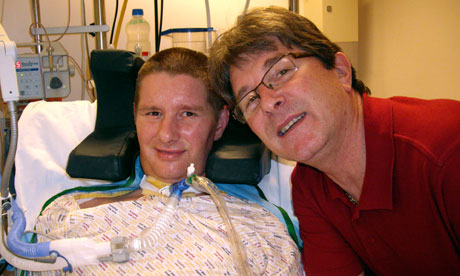I’ve just watched last night’s harrow ing BBC documentary Between Life and Death, which tracked the fate of three seriously brain injured people at the Neurosciences Critical Care Unit in Addenbrooke’s Hospital, Cambridge, following terrible road accidents.
ing BBC documentary Between Life and Death, which tracked the fate of three seriously brain injured people at the Neurosciences Critical Care Unit in Addenbrooke’s Hospital, Cambridge, following terrible road accidents.
No wonder it is a world famous hospital. I thought Neuro Intensive Care expert Prof David Menon was astounding in the way he began a dialogue with Richard Rudd by encouraging the paralysed man to use blinking when responding to his questions. And that was how Richard told Prof Menon (who lives in my village) that he wanted to stay alive; his family had been convinced there was no way in a million years that he would want to live with such severe injuries.
It clearly demonstrates that one can never be sure how one will feel in these catastrophic circumstances until it happens to you. The chances are that even if you have made a living will declaring in advance that you do not wish to be treated if you are seriously injured and unable to communicate, you could change your mind when faced with that final choice.
I remember thinking when I was younger that I would not want to continue living if I had a mastectomy. And then I became a mum and realised that my sons would still need me as their mother, regardless of how I looked and the effects of major life- saving surgery on my body. It would not be the end of the world, and last night’s sensitive documentary demonstrated that this could also be the case following a serious brain injury when a patient like Richard has “locked-in syndrome” – when someone can think, hear and feel, but is unable to speak or move their limbs. To see Richard’s smile now, one can clearly see that he is still glad to be alive.
Headway Cambridgeshire has a superb support officer at Addenbrooke’s who helps families through their horrendous trauma. Many of our service users in Cambridge have had road accidents and our professionally trained staff help rehabilitate them. I am reminded again of how wonderful our organisation is, and what a privilege it is to serve as their chair of trustees, knowing that our small charity is making a huge difference to their lives.
I attended a Headway conference at the weekend and learned that fewer people suffer brain injures today as a result of car accidents as our modern cars are much safer, but that increasing serious brain injures were caused by assaults. This is what makes me fearful as a mother of two teenage boys, I know these devastating accidents can happen to anyone without warning and shatter the lives of families for ever.
I would like to say a tremendous thank you to Prof Menon for your sensitivity and perception which came through in the documentary, as well as your brilliant skill as a surgeon, and to your superb team at Addenbrooke’s too.
Here is link to the programme on BBC iPlayer.


Amanda, how terrible for your friend. I hope with all my heart that she pulls through. Yes, we are lucky, especially around Cambridge, to have such wonderful and dedicated medics.
I watched it this afternoon myself, and heard part of the discussion about it on Vanessa Feltz’s show (BBC London) this morning. It was interesting that Richard, whose family said that he had insisted that he’d never want to live as a paraplegic, let alone in that state, said he wanted them to keep on treating him when he was asked (albeit he just blinked to say “yes”, but he made it quite clear).
I found it quite disturbing that people said they wouldn’t want to be kept alive artificially. I have a friend in America who is a quadriplegic since she was injured in a car accident in November 2002, when she was 16. She is an incomplete C1 “quad” meaning in her case that she has feeling but limited movement and requires a ventilator. She has written about the frustrations in her life but they are all about the paralysis and very little seem to be about requiring a vent. She is doing well at college and seems to think her life is worthwhile.
I didn’t see the documentary myself, but my beef with living wills is that you can say under what conditions you would like treatment withdrawn; however, I used to carry a card saying that if I ended up not being able to express my wishes, I would like all treatment to continue – until I was told that it wasn’t worth the paper it was written on. I understand the motivation behind living wills, but fear that they have been taken over by population control activists and eugenicists.
I heard about someone today who was about to be switched off life support but managed to blink his eye.
Matthew, it’s tremendous to hear that the girl you refer to has written a book and is at college, and she considers her life worth living, despite her tremendous disability. Her life would be worth a film too.
Ed, I think it’s the fact that people could unexpectedly change their mind if they have made a lviing will and would be unable to express this if they found themselves in a similar situation which makes this issue very worrying.
Ellie, Jenni hasn’t actually written a book but has a blog: The Site that Breathes
There was a film about a woman called Brooke Ellison, who is also a high-level quad on a ventilator (since age 11, I think) since she was run over on her way home from school. She went to Harvard and subsequently stood for the NY state legislature but lost.